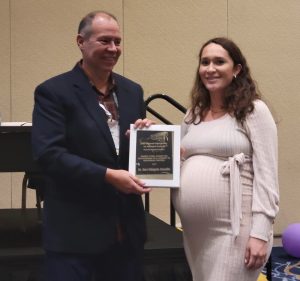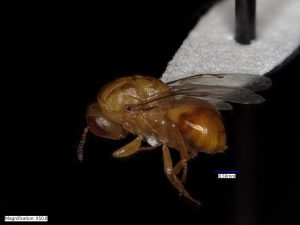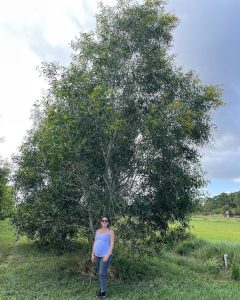
FORT PIERCE, Fla — An emerging scientist is honored with a second international award for her work to prevent an invasive tree from encroaching on Florida’s natural landscapes.
Sara Salgado pursues a Ph.D. at the UF/IFAS Norman C. Hayslip Biological Control Research and Containment Laboratory (BCRCL) at the Indian River Research and Education Center in Fort Pierce, Florida.
Ph.D. work devoted to an invasive tree, the earleaf acacia tree
Salgado’s doctoral research involves an invasive tree called earleaf acacia and includes frequent visits to a local site where nearly 200 trees thrive. The trees do not belong in Florida. Their native habitat is northern Australia, where herbivorous insects feed on them. Some of the trees at Salgado’s site stand at about 20 feet high, their branches are brittle, with bursts of furry yellow blossoms.
“I am deeply honored to receive the Robert O’Neil Award for Outstanding Ph.D. Student in Biological Control 2023 from the International Organization for Biological Control – Nearctic Regional Section (IOBC-NRS),” Salgado said. “This recognition is not just a testament to my efforts but also a reflection of the collaborative work within the biological control community. I would like to express my sincere gratitude to Dr. Carey Minteer for her mentorship and support throughout my academic journey.”
Graduate studies led by Dr. Carey Minteer
Carey Minteer oversees Salgado’s graduate studies. An UF/IFAS assistant professor, Minteer’s work with biological control agents to manage Florida’s invasive plants has earned her international respect among colleagues and land managers.
Minteer said Cesar Rodriguez-Soana, past president of the International Organization for Biological Control (IOBC) Nearctic Regional Section presented Salgado with The Robert O’Neil Award for Outstanding Ph.D. Student in Biological Control 2023 at the November meeting of the Entomological Society of America in National Harbor, Maryland.
According to the IOBC website, the Robert O’Neil Award is presented to innovational graduate students “whose contributions are likely to shape the future of biological control.” The O’Neil Award compliments an IOBC Global Early Career Award that Salgado garnered in early 2023.
Minteer, her research team, and collaborators at the U.S. Department of Agriculture Agricultural Research Service and the Commonwealth Scientific Industrial Research Organisation in Australia are investigating biological control agents for the earleaf acacia — before the weed spreads over hundreds of thousands of acres. Biocontrol agents feed on invasive plants, often reducing plant abundance and vigor and returning the “natural control” seen in their native range. The earleaf acacia’s native range is Australia, Indonesia, and Papua New Guinea.
The bug-galling wasp species

Salgado’s work focuses on two insects. One is a psyllid native to Australia but already present in Florida. The second is a bud-galling wasp, Trichilogaster, from Australia, a candidate species for biological control of the earleaf acacia. Salgado’s primary goal is to determine the host range of the tiny wasp. She said part of the work with this species will include a simulation interaction between the wasp and earleaf acacia to ascertain if the two species will cohabitate in Florida’s climate.

“Earleaf acacia is a highly invasive plant that can thrive in wet environments and disturbed areas. Our concern is protecting the sensitive and unique ecosystem of the Everglades,” Salgado said.
 9
9
